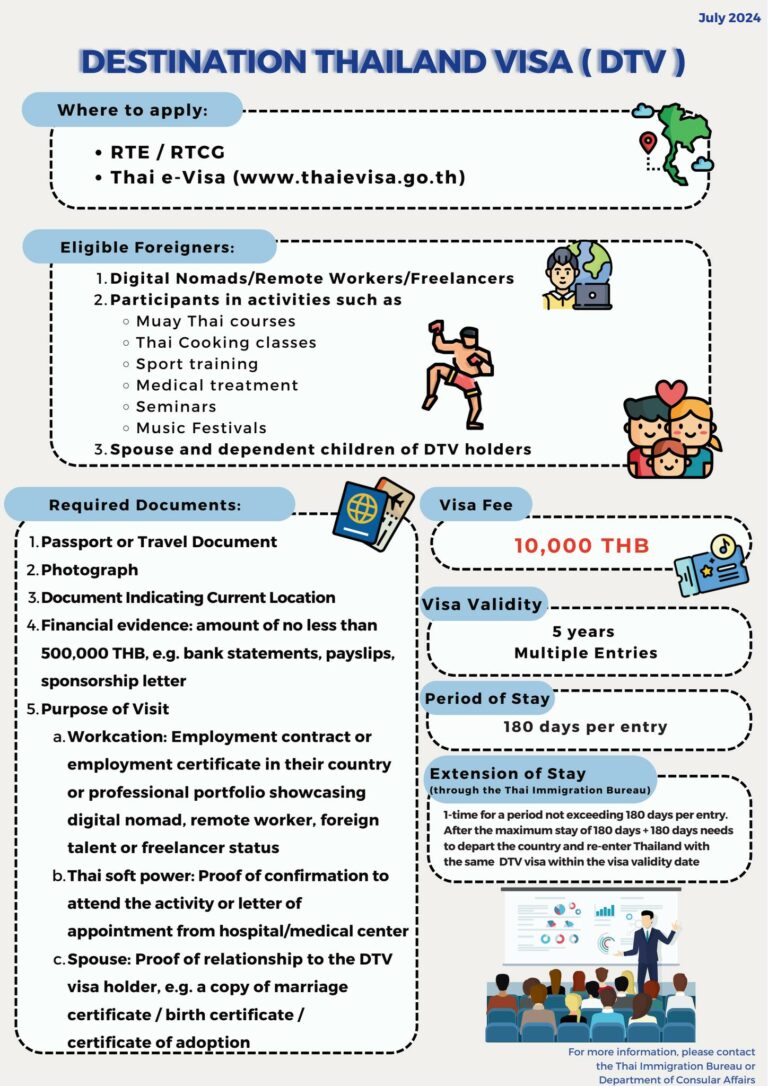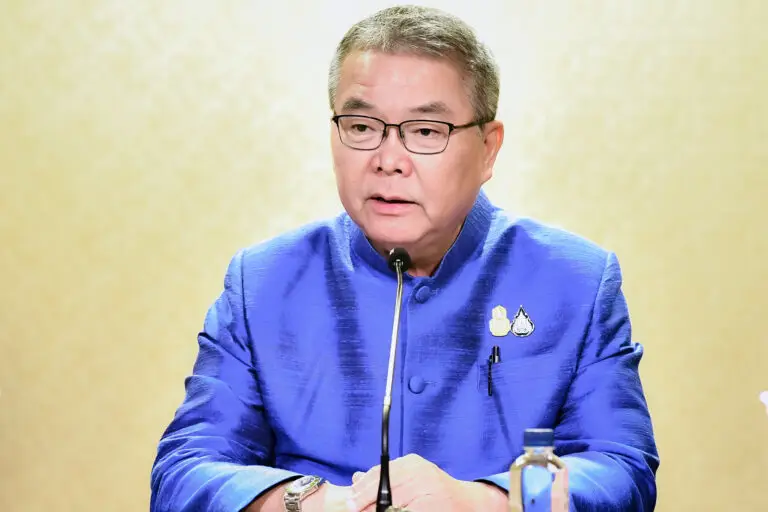New Visa Facilitation Measures to Boost Thailand’s Economy and Tourism
On May 28, 2024, government spokesperson Chai Wacharong announced that the Thai Cabinet approved new visa facilitation measures to stimulate the economy and tourism including the new ‘Destination Thailand Visa’ (DTV). These measures will be implemented in three phases.
Short-term Measures (Starting June 2024)
- Visa Exemption Extension: Visitors from 93 countries can stay up to 60 days without a visa. This aims to boost tourist arrivals during Thailand’s peak travel season.
- Visa on Arrival (VOA): Available for visitors from selected countries without Thai embassies.
- Destination Thailand Visa (DTV): For digital nomads and remote workers, attracting skilled individuals who can contribute to the economy.
- Student Visa Improvements: Facilitating non-immigrant ED visas for international students, making it easier for them to study and work in Thailand.
- Visa Policy Committee: Establishment of a committee to oversee visa policies.
Medium-term Measures (September – December 2024)
- Visa Code Reduction: Streamlining non-immigrant visa codes from 17 to 7.
- Long Stay Visa Criteria: Adjustments for retirees who wish to spend their retirement in Thailand.
- E-Visa Expansion: Extending e-Visa services to all Thai embassies and consulates worldwide.
Long-term Measures (June 2025)
- Electronic Travel Authorization (ETA): Implementation for visa-exempt travelers, integrating advanced technology for efficient screening.
Additional Benefits
According to the spokesperson, these measures aim to revitalize Thailand’s tourism industry, which was severely impacted by the COVID-19 pandemic, and to enhance Thailand’s competitiveness. The expected benefits include:
- Increased Tourist Arrivals: The new visa exemptions and types are expected to significantly boost the number of international tourists.
- Attracting High-Potential Individuals: Digital nomads and skilled workers may choose to live and work in Thailand, potentially leading to long-term business opportunities.
- Enhancing Thailand as an Education Hub: Improved visa processes for international students will attract more students to Thai universities.
Financial Implications
The Ministry of Foreign Affairs has estimated the potential revenue losses and gains from these new measures. The visa exemptions for 93 countries could result in a loss of about 12.3 billion THB per year, based on 2023 tourist numbers. However, the long-term economic benefits from increased tourism and skilled individuals residing in Thailand are expected to outweigh these initial losses.
The Destination Thailand Visa is certainly a step in a new direction for digital nomads!
For further details, you can refer to the original article on the Thai Government’s website here.
We will update these details as more information becomes available.
UPDATE 12/7/24
The Ministry of Interior has confirmed that Thailand will waive visa requirements for tourists from 93 countries starting July 15, 2024, in an effort to boost tourism and ease travel restrictions.
This expansion, up from the current 57 countries, was announced by Traisulee Traisoranakul, secretary to the Interior Minister Anutin Charnvirakul, on Friday.
The new regulation will allow visitors to stay in Thailand for up to 60 days without a visa. Additionally, the number of countries and territories whose citizens require a visa upon arrival will increase from 19 to 31.
In a further move to attract skilled workers, a new “workcation” visa called the Destination Thailand Visa (DTV) will be introduced. This visa will permit qualified foreign professionals to stay and work in Thailand for up to 180 days at a time.
The new visa measures, which are awaiting Cabinet approval, are expected to be a formality, according to Traisulee.
“The Ministry of Interior is preparing to announce the 60-day visa exemption for 93 countries, along with updating visa procedures to be more flexible, to support Thailand in attracting tourists worldwide,” said Traisulee.
The updated visa measures include four key announcements:
1. Temporary visa exemption: The announcement specifies the list of countries/territories whose passport holders or travel document holders are temporarily exempt from visa requirements for tourism, short-term business, or work purposes and can stay in the Kingdom for up to 60 days. The number of countries/territories receiving the visa exemption (visa-free) has been increased to 93, up from the previous 57.
2. Visa on arrival eligibility: The list of countries eligible for Visa on Arrival (VOA) at immigration checkpoints will be expanded to 31 countries and territories.
3. Destination Thailand Visa (DTV): This new visa type will be introduced for high-skilled professionals, freelancers, remote workers, and those wishing to stay in Thailand for both work and tourism. The DTV will allow a stay of up to 180 days per entry, with a visa validity of five years.
4. Special permission for study and work: This announcement updates the rights for international students entering Thailand for undergraduate studies and above, holding a Non-Immigrant Visa code ED. It aims to attract potential and skilled individuals to the country’s labor market by extending their stay for one year after graduation to seek employment, travel, or engage in other activities in Thailand.
“Deputy Prime Minister and Minister of Interior Anutin Charnvirakul has reviewed and signed all four announcements. They are now in the process of being presented to the Prime Minister for signing. After that, they will be published in the Royal Gazette, and all announcements will take effect from July 15, 2024, onwards,” added Traisulee.
These measures are part ofthe government’s policy under Prime Minister Srettha Thavisin to drive the tourism economy by attracting more international tourists and facilitating travel.
By Online Reporter
Foreign tourists arrive at Suvarnabhumi Airport. File photo
Source:: HUA HIN TODAY 2024-07-12



